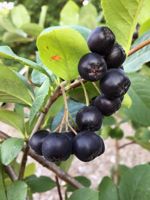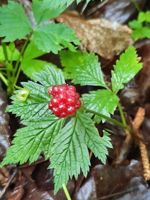Mon-Fri 9am - 5pm Mountain time
Aronia Berry vs Dewberry (Dwarf Raspberry)
Aronia melanocarpa
Rubus pubescens
NOT AVAILABLE THIS SEASON - MIGHT RETURN
Aronia Berry produces black fruit that is often considered too astringent. This is why they are also referred to as Black Chokeberry. It is native to Eastern Canada and the Eastern United States. White to pink flowers appear in the spring which provides a nice contrast to the dark green foliage. In fall the leaves turn a vibrant orange to red.
It has a fast growth rate, strong roots, and can tolerate growing in wet soils. This makes it well suited for various projects including forming hedges, bank stabilization, erosion control, and in wetter riparian areas. They are also well suited as an understory plant as it grows well under other trees.
Aronia berries have their own unique flavour. The polyphenols and anthocyanins are touted as healthy antioxidants and lots of research seems to be underway on the health benefits of this fruit.
Dewberry (Rubus pubescens) is a native, low-growing perennial that spreads by creeping stems to form a natural groundcover. In spring, it bears small white flowers that attract pollinators, followed by bright red edible berries resembling tiny raspberries. They are an important food source for birds and mammals.
Widespread across Canada, Dewberry serves as a larval host plant for butterflies such as the Spring Azure (Celastrina ladon), adding to its ecological value. It is a suitable choice for naturalization, pollinator gardens, habitat plantings, and ecological restoration projects.

